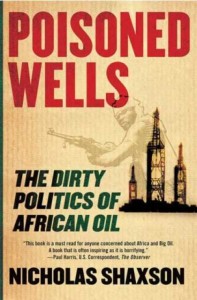|
Reviewed by David J. Ribner, Recent Graduate of the MA Program, Department of War Studies, King’s College, University of London As the world’s thirst for oil remains unquenched and geopolitical volatility in the Middle East escalates, the global oil industry is increasingly turning its attention to West Central Africa’s Gulf of Guinea. Recent advances in deep water drilling technologies and close proximity to the West has turned what was once viewed as a backwater into an ever more desirable location for investment and production. So much so, that the United States currently imports more crude oil and petroleum from Nigeria and Angola than it does from Saudi Arabia and Kuwait. For the oil-producing states in the region, however, oil has been more of a curse than a blessing. Billions of dollars in revenue have failed to trickle down through the economy and much of the money regularly disappears into the black hole of entrenched corruption networks. In these states, oil keeps strongmen in power, polarizes societies which compete over the spoils, and sows the seeds for civil war. How did this situation arise? How is it that so much money has failed to significantly improve the development of regional states? The answers to these questions can be found in Nicholas Shaxson’s interesting and insightful primer on the politics and economics of the oil-producing states of the Gulf of Guinea, Poisoned Wells: The Dirty Politics of African Oil. Shaxson, an independent journalist and associate fellow at Chatham House, spent much of his career reporting in the region and is an expert on the African oil trade. In the book, he uses his travel experiences as a platform for exploring the recent political histories and oil economics of six oil-producing states: Nigeria, Equatorial Guinea, Gabon, Congo (Brazzaville), Angola, and São Tomé and Principe. Written almost like a travel journal, each chapter focuses on a different country and weaves the story of an individual through the complexities of the political economics of oil. The result is a snapshot of how oil has affected each of the six countries. The book is particularly successful in describing issues that have arisen in individual countries that others are likely to face in the future. The development of corruption networks in Nigeria, Dutch disease in Angola, and the problems encountered by uneducated São Toméan leaders negotiating exploration and extraction contracts with global oil companies all have regional resonance and serve as red flags for neighboring states. La Françafrique—the web of French diplomacy, military activities, and commerce connecting Paris and the African capitals of former French colonies—receives a great deal of Shaxson’s scrutiny in this book. Networks of monetary and trading relationships, secret defense accords, and mineral extraction are run by members of the French elite connected through shared service in political posts, state companies, and the secret services. Slush funds of African oil money are used both by African leaders and French oil executives, and investigators in France have found the money making its way back into the French political arena. Shaxson concludes there is a considerable need for good governance and greater transparency in the global financial system which at present easily facilitates the criminal enterprises and treasury looting of corrupt African oil players. Surprisingly, the United States is the primary destination for money laundering and foreign corruption, and while countering illegal activity has begun—as in the case of the Riggs Bank scandal—much more needs to be done. Poisoned Wells is not without its faults. The author occasionally is prone to make emotional and somewhat extreme comments, such as “oil corrupts and subverts the very essence of what it means to be human in society.” For this reviewer, the statement is both unscholarly and excessive, as are Shaxon’s multiple out of context references to the War in Iraq and Islamic terrorism that seem politically motivated. Criticism aside, Shaxson’s Poisoned Wells is a clear and informative work, written based on a wealth of personal experiences. It should be considered an essential read for any student of the Gulf of Guinea and African oil. |


 Poisoned Wells: The Dirty Politics of African Oil
Poisoned Wells: The Dirty Politics of African Oil